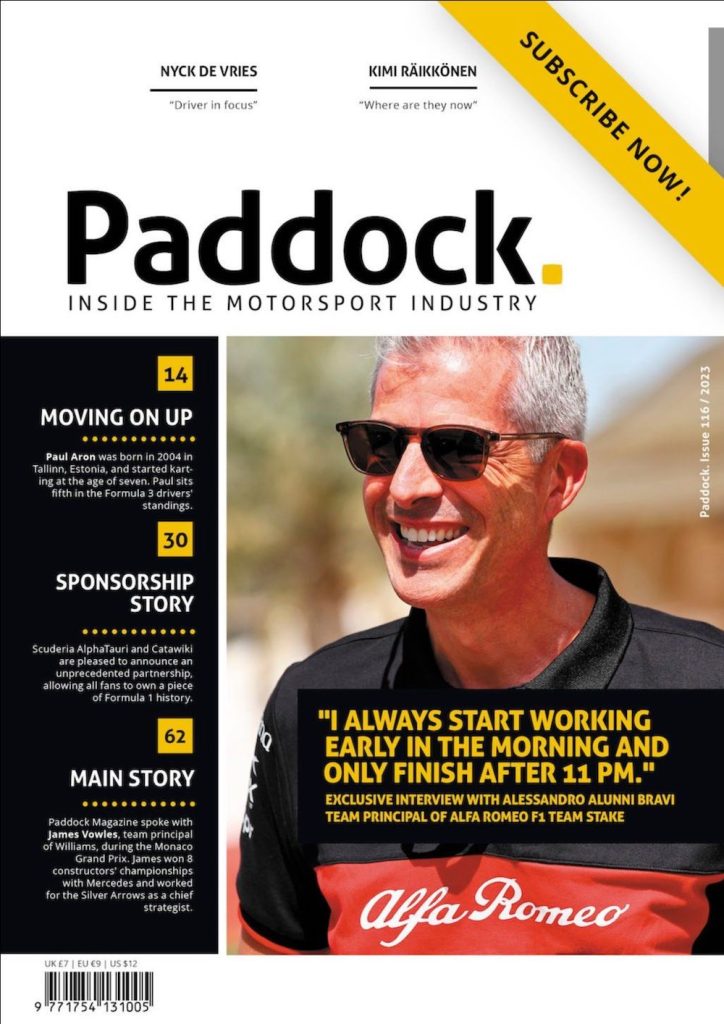Back in April 1994, at the London UK Head Office of Accenture (then Andersen Consulting), the Motorsport Industry Association was launched. There were many reasons why I felt that such an organisation was long overdue, the primary one being a need to formalise motorsport as an industry in its own right and to gain government recognition. Another reason, one that I was very passionate about, was to introduce industry-specific business and technical skills career training programmes. At that time there were few qualifications if any, and motorsport was seen as being just an add-on to the automotive industry.
Click here to subscribe to our print edition!
Within 3 years of launching the MIA, the first ever dedicated motorsport engineering degree course was established, here in the UK.
As you can imagine, some 22 years on from that MIA launch, it’s satisfying to witness the vibrant scene that now exists in terms of motorsport engineering education, not just here but internationally.
A few weeks ago, I was visiting the Wheatley Campus in Oxfordshire of one of the leading motorsport engineering universities, Oxford Brookes. I was standing in the motorsport technology building, talking to professor Gareth Neighbour, Head of the Mechanical Engineering and Mathematical Sciences Department. We were looking at the latest two additions to the department’s comprehensive fleet of race cars on which students work as part of their education. One was a stylish Force India F1 car; the other was an impressive looking BRDC F4. On the wall was a series of photographs showing groups of Oxford Brookes alumni currently working in international motorsport teams. It led to my asking the question “how many of the 2016 F1 teams currently employ Brookes alumni?” There was a slight pause before the professor replied: “A good question! I think I’m right in saying all of them”.
Having later confirmed the validity of the statement, I set about trying to determine just how Oxford Brookes University has managed to find itself in this enviable position. Where better to start than by meeting up with one of the alumni who has already made a name for himself within Formula 1.
Case study
Born in Canada, Gavin Ward grew up just down the road from the famous Mosport circuit. At an early age he developed a love for drawing road cars, but following his first visit to the race track, that quickly changed to sketching race cars. TV coverage of Formula 1 added to what was an increasing determination to get involved in the sport somehow. It wasn’t surprising that at the very first opportunity he started participating in karting. It didn’t take long for him to realise, however, that even at the junior levels, a significant budget was a pre-requisite for progressing up the ladder.
It made sense to focus more on the technical side of the sport and he found a way of helping a local Formula Ford driver prepare and run his car in local races. It proved to be a turning point in his life. He soon found himself in the Formula Ford paddock at Ontario, where the main event was an IndyCar race. To see these cars and the enormity of the support operation was a revelation for Gavin. On top of all this, the driver whom he was helping, “Smoking” Steve Pickering, won the FF race. The die was cast!
When the time came to make a decision about his future education, a motorsport engineering university became Gavin’s aim. He decided that it made sense to look at moving to the epicentre of motorsport, allowing him to become totally independent. With family assistance, he made the trip to the UK. Faced with a wide choice of options, including Bath, Cranfield, Warwick and Bolton Universities, he opted for Oxford Brookes as being the best for his personal aspirations. He started his course in September 2003.
Why Brookes? Gavin told me that it was partly because of the reputation that the university has within the motorsport industry, but also because of its highly acclaimed Formula Student programme, which he saw as a vital step on the route to a Formula 1 career.
How many of the 2016 F1 teams currently employ Brookes alumni? A good question! I think I’m right in saying all of them.
In 2006 Gavin became the Race Engineering Team Leader for Oxford Brookes Formula Student programme. He saw that he explained, as a tremendous experience, one that taught him a lot of skills that he would come to benefit from later in his career. Then came an invaluable spell of work experience at Red Bull F1 before Gavin graduated. He was offered a permanent position with the Red Bull team. His first role, one that lasted for nearly four years, was as Trackside Controls/Tyre Engineer, responsible for the trackside support and development of the on-board control systems on both RBR race cars at Grand Prix events and track tests. Today, Gavin is Red Bull F1’s Aerodynamicist.
I asked him if his route to Formula 1 has been the right one. He explained that not only was the highly practical nature of the tuition at Brookes suited to his learning style but that the level of responsibility that went with being the Formula Student Team leader prepared him particularly well for stepping straight into the sport. He is now one of Formula 1’s most respected engineers.






Related Articles